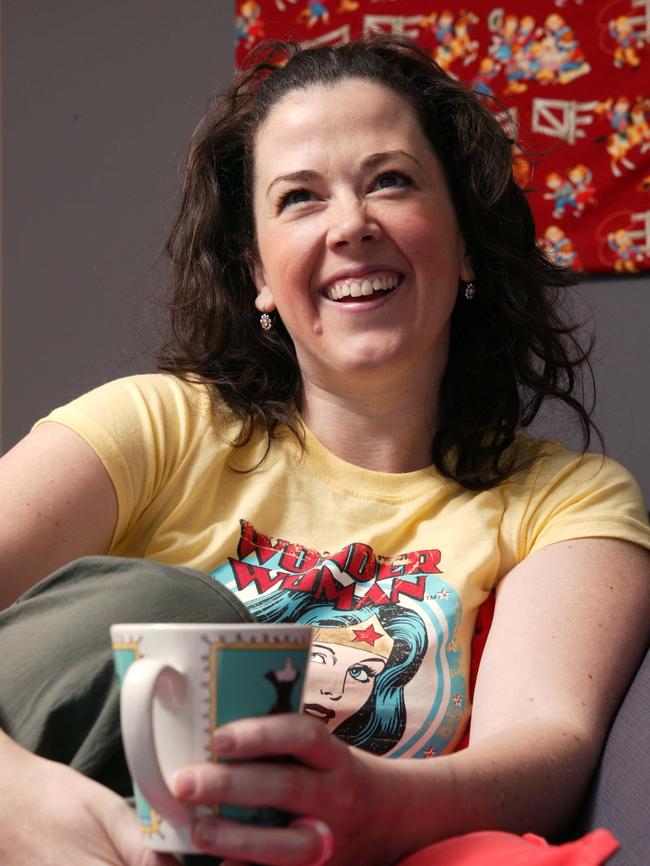Life after redundancy: How losing your job can transform your life
WHEN Ginger Gorman was made redundant, it was both shocking and humiliating. Never did she think it would transform her life.

Work
Don't miss out on the headlines from Work. Followed categories will be added to My News.
EARLY this year I was made redundant by the ABC.
According to figures from the Media Entertainment and Arts Alliance, I’ve joined the ranks of more than 1600 other media professionals who have lost their jobs since 2011.
I’m not too proud to tell you that.
After working so hard for so long, it was both shocking and humiliating.
That’s how I found myself carefully putting on postbox-red lipstick and an orange blouse emblazoned with photographic print of a sunrise.
On the way to my first career counselling session provided to me by the ABC as part of the redundancy package, my breathing was shallow and jumpy. I was shooting for a sense of hope and optimism but didn’t even come close.
Earlier that morning my husband noticed my shaky demeanour and clasped me by both shoulders.
“Don’t cry!” he advised sternly, wanting me to appear professional.
After 13 years at Aunty, I was put into one of the so-called “Hunger Games” redundancy pools with three of my long-time friends and colleagues. The idea was that ABC management would audit our skills and then rank us against each other. The person who scored the lowest would go.
The women in the pool with me were hardworking and talented mid-career radio producers. Like me, they were mothers with young children and mortgages. One of them was 38 weeks pregnant with her second child.
It was hard to sleep in the days after the redundancy pools were announced. Some of us wept. On occasion our ABC colleagues looked at the ground when we walked by, not quite knowing what to say.
Unable to accept the merit of this process, I reluctantly decided to put my hand up. It was terrifying to send off the email to my bosses explaining I’d be “happy” to go and even worse to get a response back accepting this proposal. A small part me wanted to be wanted, but in the end we are all replaceable.


Former Triple J presenter, Rosie Beaton, says she was “absolutely devastated” when she got the news.
“I had no idea I was being made redundant, no warning at all. I thought I was just having an end-of-year meeting with my manager. I had always worked so hard and I took it personally,” she says.
Lyndal Curtis is Canberra Bureau Chief for Sky News. Until November last year, she was ABC News24’s political editor.
Lyndal decided to opt for a redundancy in the face of restructuring.
“It meant leaving a job I loved … and an organisation I had dedicated a significant period of my life to,” Lyndal explains.
She experienced a sense of “loss” after the redundancy and also “a sense of deep disappointment about how the process had been handled.”
A recently published paper by academics at La Trobe University studied 95 journalists who were made redundant in 2012.
The study found that within one year, most people seeking re-employment had found work of some kind. However, the paper states “many were emotionally traumatised” by the experience.
The person who helped scrape me up after the redundancy — the same person whose office I was driving to on that January day a year ago — was Katrina Howard, executive and career transition coach.
She says people can respond to redundancy with a huge range of emotions.
“All the feelings you’d expect of the stages of grief can appear — shock, denial, anger, sadness and acceptance that: ‘It is what it is’.”
Katrina goes on to say that some people may even welcome the change, especially if they’ve felt stuck in their current role.
This precise thing was one of the things that prompted me to take this leap into the unknown; my once-vibrant career had stalled.
There are plenty of cheesy sayings about the benefits of going out on a limb and how great it is to take a big risk.
However, leaving a permanent gig at Australia’s national broadcaster wasn’t everyone’s idea of a great plan. Truthfully, I was petrified.
It’s funny how things work out, though. I let my network know that I was looking for work — and work appeared.
Overnight, I became a freelancer and started investigating and reporting the social justice stories dear to my heart.
Without the interruptions of a busy and noisy open plan office, ideas seemed to mushroom.
It was possible to think and write freely.
I resumed tutoring at the University of Canberra, got the chance to make a radio documentary for Radio National and appeared on Channel 10’s The Project and Channel 7’s Daily Edition.

Without the necessary business skills, it was a steep learning curve. And even after a year, I still sometimes get a terrible crush of self-doubt. What if, at any moment, someone realises it’s just me typing away in my spare room wearing tracksuit pants and a fraying singlet top?
Interestingly, two of the other women who were put into the redundancy pool with me have since left the ABC of their own accord.
After her decision to make a sea change and move to the NSW North Coast, long-time friend and former fellow ABC producer Virginia Jones explains: “Being faced with redundancy makes you consider your Plan B for life in a way that nothing else really does.”
“When I was put in the pool it made me feel like all the years of hard work — and free overtime — were not valued and there’s not much coming back from there.
“Suddenly a job that had previously been fun felt like a dead end,” she says.
In words I could have well said myself, Virginia reflects that her “future, even though it’s still uncertain, looks more like I want it to look than it did one year ago.”
About six months after I took the redundancy, my husband jokingly told me that I’d become a nicer person — less stressed, less short tempered. He said I laughed more.
“I can see you’re doing the work you’ve always wanted to do,” he said, adding: “You’re happy”.
Rosie is currently working as a presenter on one of Qantas’ in-flight radio channels and has just qualified to be a celebrant.
While she’s looking for “her next dream job,” Rosie is volunteering for Sydney Cats and Dogs home.
“I had an epiphany one Friday at the shelter as I was washing dog bowls in the sun. I thought ‘Wow. I’ve never been happier’.
“I would usually be working to a deadline trying to get everything done before the weekend,” she reflects, with a laugh.
Lyndal says the financial security of the redundancy package allowed her to take a year off work — and this changed her life.
“I decided to take a break and spend time with my children who had always suffered from two parents who had stressful and very busy careers.
“The joy in just being able to be there for them, for them being able to download to me after school, to talk over preparing the evening meal, can’t be underestimated.
“Being out of work meant reducing the amount of chaos in our lives and that was priceless,” Lyndal says.
Not only this, but Lyndal went back to a long-neglected passion — photography.

“For me, photography absolutely calms me in a way nothing else does. Time stops for me when I’m out taking pictures,” she says.
Career coach Katrina Howard agrees that the financial cushion of a redundancy can give a person room to explore their options.
“Creative alternatives often come to people when they’ve taken themselves off the hamster wheel for a bit,” she says.
After a redundancy, Katrina suggests reflecting on one’s “whole career [and] not just the most recent job” to help “identify the work they have really enjoyed and thrived on in the past, the achievements they’re most proud of and what roles or goals are they still keen to achieve in their career.”
“This process can help to provide a clearer direction for their job search,” she says.
Lyndal says she’s learned a powerful lesson from leaving the ABC after 21 years.
“For a long time my sense of self was wrapped up in my job. I defined success through my work.
“But actually, my success is having a happy and settled family. When everything else turns to sludge, my husband and my children are still there — supporting me, encouraging me, making me laugh and occasionally driving me up the wall.
“They are the centre around which everything turns and if everything is right with them, nothing else really matters,” she says.
As for me, this year I’ve learned a tough lesson in backing myself. I’ve learned that if I manage to do that, leaping into the unknown isn’t so bad. There are hands that will help catch me. I won’t fall.
I’ve learned that opportunities are not always where you think you’ll find them. Most of all though, I’ve learned that from the devastation of redundancy it’s possible to transform.
Ginger Gorman is an award-winning print and radio journalist, and a 2006 World Press Institute Fellow. Follow her on twitter: @GingerGorman
Originally published as Life after redundancy: How losing your job can transform your life



